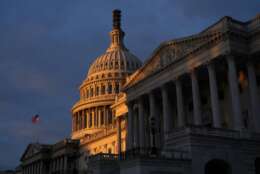National Association of Letter Carriers
-
More than 200,000 U.S. Postal Service employees have just received their first two catch-up cost-of-living adjustments, and will soon receive their third COLA.
August 23, 2017 -
An investigation by the Office of Special Counsel Hatch Act found that from September to November 2016, 97 letter carriers took more than 2,700 total days off to participate in political campaigns.
July 20, 2017 -
Despite double-digit growth in its package delivery during last year's holiday season, the U.S. Postal Service posted a $200 million net loss for the first quarter of fiscal 2017.
February 09, 2017 -
Why would federal workers boo a president for giving them a 9 percent pay raise, then cheer another one for a 2.1 percent increase? Senior Correspondent Mike Causey says timing is everything.
December 12, 2016 -
The most recent plan to save the Postal Service involves taking a page out of the private sector’s book: required enrollment in Medicare.
November 29, 2016 -
Every year during Open Season only a small number of federal workers and retirees change health plans, but Senior Correspondent Mike Causey says what if your plan dropped you?
November 01, 2016 -
The Postal Service wants to set up its own health plan for workers and Senior Correspondent Mike Causey says non-postal workers should pay attention.
October 26, 2016 -
James Sauber, vice president of the National Association of Letter Carriers joins host Mike Causey to discuss the postal reform package and what it means for feds and retirees. October 26, 2016
October 25, 2016 -
The U.S. Postal Service says it has "broad bipartisan support" from Congress to ease some its financial burdens. But until that time comes, USPS doesn't have much room to improve the situation it's in.
August 09, 2016 -
The U.S. Postal Service fared better this financial quarter than it did last year, but the Postmaster General says Congress has been slow to remove a weight around the agency's neck.
May 10, 2016 -
Democrats and Republicans both agree the Postal Service needs congressional help to better its budget, but getting there is a tougher problem.
February 04, 2016 -
The Postal Service continues to press for substantial legislation changes to remain a competitor in the mail and package delivery field. It recorded its ninth consecutive year of billion dollar losses.
November 13, 2015 -
Sen. Tom Carper (D-Del.) has introduced legislation to help the Postal Service recover from its financial woes, revitalize employee morale and restore the public's faith in the agency.
September 17, 2015 -
The Postal Service's latest financial results are no better than any of their recent numbers. But they might not be as bad as they look. Different interpretations of those numbers cause some leaders to think the Postal Service has a faster route back to profitability than Congress does. Fredric Rolando, president of the National Association of Letter Carriers, told In Depth with Francis Rose nobody argues about the numbers themselves. It's more about how you read them.
June 02, 2014 -
Postmaster General Patrick Donahoe said the service can no longer afford to delivery first class mail six-days a week. He said cutting back by one day a week would save about $2 billion a year. USPS still would have a $14 billion deficit and needs help from Congress to address other fiscal challenges.
February 07, 2013










